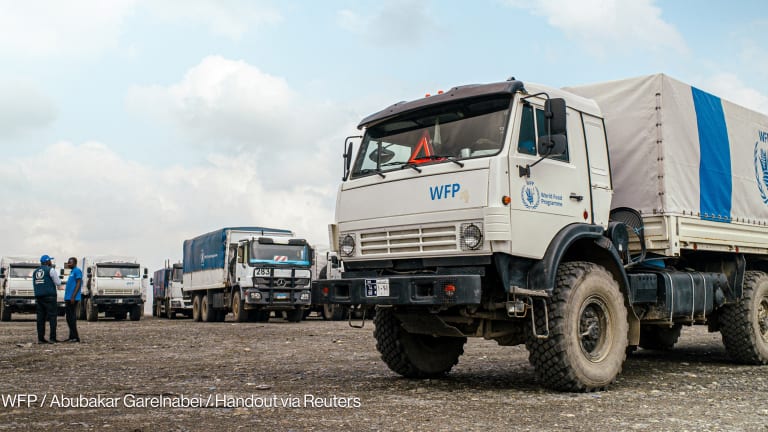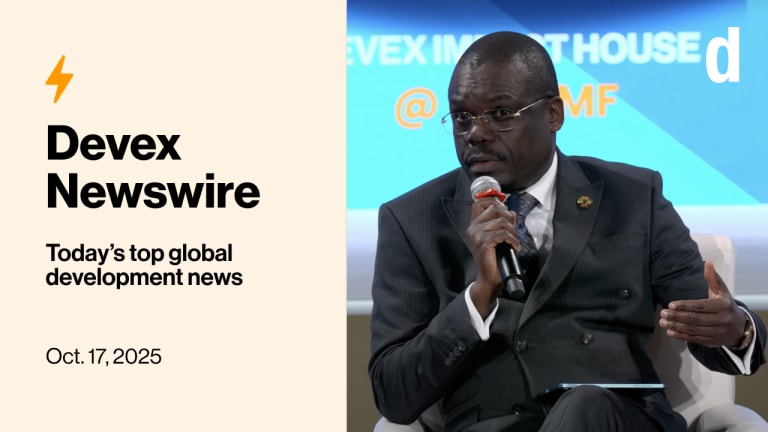
Since last October’s military coup, Sudanese state ministers and officials have resorted to practices used by the former regime of dictator Omar al-Bashir, such as piling on bureaucratic procedures to extract profit and attempting to interfere in INGO procurements, according to aid workers, experts, and U.N. agencies.
Experts say that the international community — donor countries, INGOs, and U.N. agencies — should form a united front to push back against corruption, especially since nearly half of the country’s 44 million people are expected to need humanitarian assistance due to food insecurity this year.
“There will be a need for major relief operations in the coming months, and therefore, this is the time for humanitarian agencies to speak out about these corrupt practices and denounce them,” said Suliman Baldo, a Sudanese expert on humanitarian affairs. “They must push the government to act fairly.”
US will resume aid funding for Sudan but bypass military government
The U.S. government had frozen funding to Sudan following the 2021 military takeover, but officials now say it will resume. USAID intends to support civil society organizations, and funding will bypass the military government.
Under Bashir, the Humanitarian Aid Commission, or HAC, was staffed by security officers who frequently denied access to INGOs and treated foreign aid workers as western spies. In 2009, Bashir kicked out 13 INGOs after the International Criminal Court indicted him on accounts of war crimes and crimes against humanity for atrocities committed in the western state of Darfur.
Bashir, who was eventually charged with genocide, fell from power a decade later. His departure led to a joint civilian-military government and optimism among relief agencies that they would no longer face major impediments to their work.
While HAC was never reformed or replaced despite efforts to do so, aid access did improve considerably due to the political will of the civilian administration during the brief democratic transition. But now, authorities are reintroducing constraints since the military consolidated power.
Requests for ‘Fees and Incentives”
INGOs that spoke to Devex under the condition of anonymity, for fear that they could lose aid access if they were identified, all attributed the practices to the halt in billions of dollars in international development aid in response to the coup. The pause in funding has been welcomed by Sudanese protesters, yet it has compounded an already acute economic crisis by accelerating inflation and eroding the salaries of civil servants. Donors have since pivoted to funding humanitarian organizations, making them lucrative sources of revenue for federal and state officials.
Paola Emerson, the head of the U.N. Office for the Coordination of Humanitarian Affairs in Sudan, told Devex that new bureaucratic procedures, which sometimes require aid agencies to pay additional fees, have been introduced.
She said that state level authorities are particularly requesting more ‘fees and incentives’ from INGOs, but UNOCHA doesn’t know how much money is being paid or what exactly is being requested. When reporting expenses, INGOs usually list a figure that accounts for all their ‘overhead or operational costs’ without specifying the amount of each item or fee, she explained.
"Nobody tracks the actual amount. It is just the cost of doing business,” Emerson said. “But with the current economic crisis, we are seeing more requests and higher amounts requested … in terms of the financial amount [required to complete] procedures and in terms of more procedures being asked.”
The country director of one INGO, which operates in several states in Sudan, told Devex that many aid organizations are reluctant to reject these new requests since they could lose vital access or be kicked out of the country.
He noted that military intelligence officers are once again stationed in HAC state offices to reassert their presence and control over relief work. Devex learned of one recent incident where military intelligence prevented all INGOs from reaching a conflict zone in Darfur as a consequence for one of them refusing to ferry out wounded soldiers because it didn’t have a driver.
“Overnight, you can be blocked off by [military intelligence] … this is just an example that if they want to block access, then they will block access,” the country director said.
A Slippery Slope
Aid workers and U.N. agencies told Devex that there were always fees built into the technical agreement that each INGO must sign with the relevant ministry at the federal and state level before commencing a project. For instance, if a project is related to mitigating a public health crisis, then the technical agreement would be signed between the INGO and the health ministry. Under Bashir, these agreements were traditionally intended to monitor and restrict INGOs, aid groups said.
Since the coup, many aid workers said that they were unsure if the new fees being asked of INGOs were included in the technical agreements they had signed. They cited a clause in their agreement that in theory requires state ministry and HAC officials to do an annual evaluation of INGO projects — a process that U.N. agencies are exempt from.
This process was dormant for the last two years, but the custom has resumed since the coup. Furthermore, INGOs are now required to foot the travel expenses and day wages for the officials evaluating them.
According to INGOs, the fees are minimal and amount to paying roughly $20 a day for at least one — sometimes several — monitors over a period of three to five days. But this sum can add up, since there are more than 70 INGOs operating in Sudan, with each one administering roughly between five to 20 projects annually, aid workers said. INGOs have to pay similar fees to advertise jobs in each state, pay HAC officials to sit in on job interviews, pay to renew permits and to obtain I.D cards for their entire staff.
Aid workers fear that costs could arbitrarily spike at any time, with the head of one INGO noting that a state HAC commissioner recently asked him for a vehicle.
“The authorities said that another [aid] organization had given them a car and they asked if I could do the same,” he told Devex. “When I declined, it didn’t impact our access.”
Devex contacted the HAC Commissioner in Sudan’s capital of Khartoum, Dr. Najm al-din Musa, to ask him about the reported increase in requests for fees and incentives from state HAC commissioners, but he declined to comment over the phone.
Keeping neutral
HAC commissioners and other state officials are also requesting to be involved in procurements, according to one source with detailed knowledge of aid activities across the country who was not authorized to speak to journalists. The source said that he is aware of at least three or four procurement-related requests from officials this year, who either wish to be part of the bidding panel or to review the chosen tenders.
“[Local aid groups] should receive adequate core funding and training to develop the institutional strengths they need to be conflict sensitive, and [to be] as impartial as possible themselves.”
— Dorette Besser, past head of the Conflict Sensitivity Facility in SudanEach INGO is supposed to form their own bidding panel internally to award tenders for procurement, he explained. So far, INGOs have refused to allow government officials to sit on their panels for fear that they would be pressured to award contracts to companies that are linked to security services implicated in rights abuses.
In Sudan, the military and other security forces have a monopoly over dozens of civilian sectors in the economy such as fuel, wheat, and car imports, as well as the provision of water and telecommunication services. Some INGOs fear that they may soon have little choice but to award a contract to a company linked to the security apparatus, which could sow distrust between the INGO and recipients of aid – especially in times of conflict.
“I think there is a real risk in INGOs not being sensitive enough in times of increasing conflict regarding how our neutrality is perceived by beneficiaries,” said the INGO leader who was asked for a car.
Dorette Besser, who until last month headed the Conflict Sensitivity Facility in Sudan, a think-tank that focuses on how aid groups can avoid fueling conflict through their operations, told Devex that it is paramount for INGOs to work and boost the capacity of independent local partners. That way, aid agencies can better understand the local context and avoid causing harm.
“[Local aid groups] should receive adequate core funding and training to develop the institutional strengths they need to be conflict sensitive, and [to be] as impartial as possible themselves,” Besser told Devex. “Their guidance on how…to sensitively navigate dynamics and volatile contexts is essential, both from the perspective of immediate practicalities and risks and long-term implications and sustainability.”








